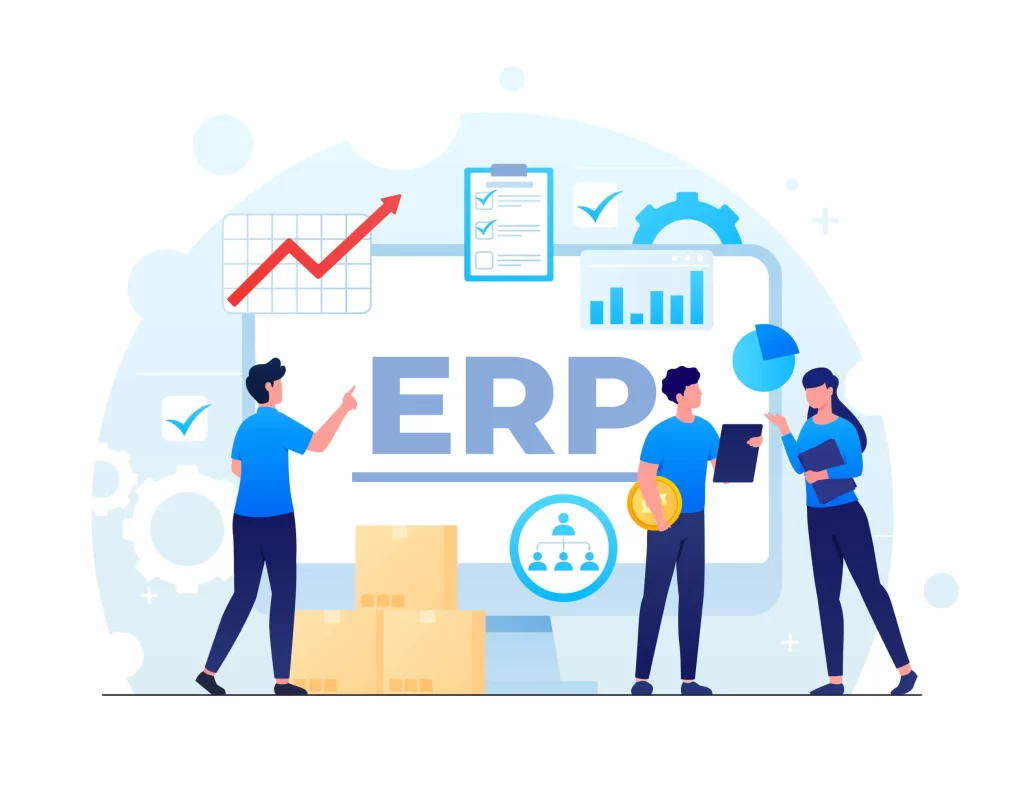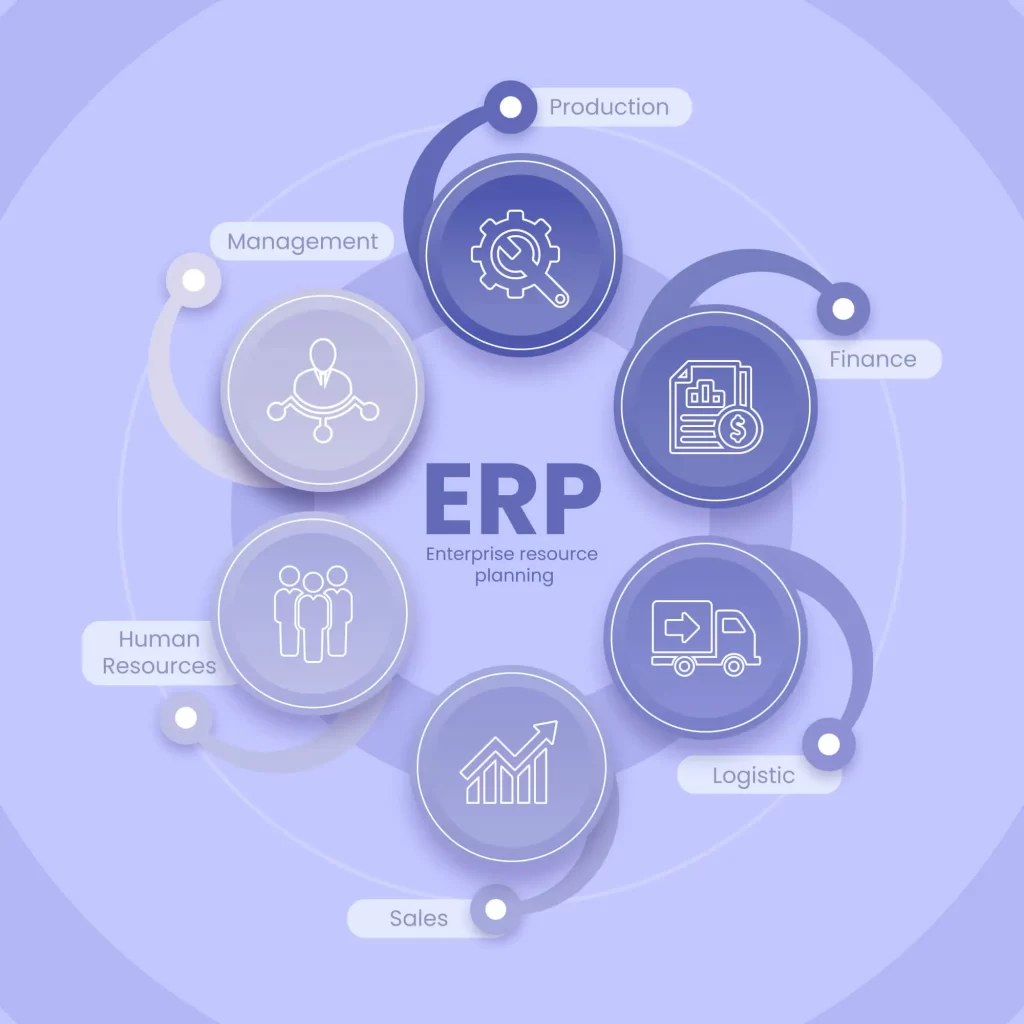Efficiency and effectiveness are critical in the competitive world of business. To maintain a competitive edge, organizations continually search for methods to optimize their operations, streamline processes, and boost productivity. Among the array of tools available for this purpose, Enterprise Resource Planning (ERP) software stands out. In this blog post, we’ll explore the essence of ERP, understand why companies adopt it, and uncover the numerous benefits it provides.
What is ERP?
ERP, or Enterprise Resource Planning, is a comprehensive software solution aimed at integrating and streamlining diverse business functions within an organization. These functions often encompass finance, human resources, supply chain management, manufacturing, customer relationship management (CRM), and additional operational aspects. ERP systems serve as centralized platforms facilitating data collection, storage, and management, fostering smooth communication and collaboration across departments.
Key Features of ERP:

Integration: ERP software seamlessly integrates various business processes, including finance, human resources, supply chain management, manufacturing, and more. This integration eliminates data silos and ensures consistent information flow across the organization.
Automation: One of the primary benefits of ERP is automation. By automating repetitive tasks such as invoicing, inventory management, and reporting, ERP systems reduce manual effort, minimize errors, and enhance productivity.
Centralized Data Management: ERP serves as a centralized repository for all essential business data. This centralized approach ensures data consistency, eliminates redundancy, and provides real-time access to critical information for informed decision-making.
Advanced Reporting and Analytics: ERP systems offer robust reporting and analytics capabilities, enabling businesses to gain actionable insights into their operations. From financial performance analysis to supply chain optimization, ERP analytics empower organizations to make data-driven decisions and drive continuous improvement.
Scalability: ERP solutions are designed to scale alongside the business. Whether expanding operations, adding new product lines, or entering new markets, ERP systems can adapt to evolving business needs without significant disruptions.
Enhanced Security: Ensuring strong protection measures is crucial in today’s digital world. ERP systems come equipped with advanced security features to safeguard valuable business data from cyber threats and ensure adherence to industry regulations.
Why Do Companies Use ERP?

Now that we’ve explored the essential features of ERP, let’s dive into why companies choose to implement these systems.
1. Efficiency and Automation: One of the primary reasons companies adopt ERP systems is to automate manual processes and increase operational efficiency. By eliminating redundant tasks and streamlining workflows, ERP software enables employees to focus on more strategic activities, ultimately boosting productivity.
2. Data Integration and Visibility: ERP systems consolidate data from across the organization into a single, unified database. This integration ensures data consistency and provides real-time visibility into key metrics and performance indicators. Decision-makers can access accurate, up-to-date information to make informed choices and drive business growth.
3. Improved Decision-Making: With access to comprehensive data and analytics, ERP users can make data-driven decisions that align with organizational goals. Whether it’s forecasting demand, optimizing inventory levels, or identifying cost-saving opportunities, ERP software empowers decision-makers with actionable insights.
4. Enhanced Customer Service: ERP systems often include CRM modules that allow companies to manage customer interactions, track sales leads, and provide personalized service. By centralizing customer data and automating processes, organizations can deliver superior customer experiences and build long-lasting relationships.
5. Scalability and Flexibility: As businesses grow and evolve, they need scalable solutions that can adapt to changing needs and market dynamics. ERP software offers scalability and flexibility, allowing organizations to add new modules, users, or functionalities as required, without disrupting existing operations.
6. Regulatory Compliance: Compliance with industry regulations and standards is essential for businesses operating in highly regulated sectors. ERP systems help companies ensure compliance by automating compliance processes, maintaining audit trails, and generating accurate reports for regulatory authorities.
7. Cost Savings: While implementing an ERP system requires an initial investment, the long-term benefits often outweigh the costs. By streamlining processes, reducing errors, and optimizing resource allocation, ERP software helps companies achieve cost savings and improve profitability over time.
Conclusion:
Enterprise Resource Planning (ERP) is a powerful tool that helps companies streamline their business operations, improve efficiency, and drive growth. By integrating various functions and providing real-time visibility into critical business data, ERP software empowers organizations to make informed decisions and stay ahead of the competition. While the initial implementation may require time and resources, the long-term benefits of ERP far outweigh the costs, making it a worthwhile investment for businesses looking to achieve sustainable success in today’s dynamic marketplace.



